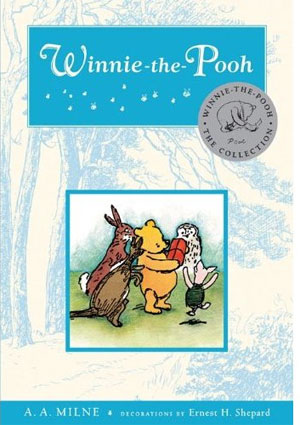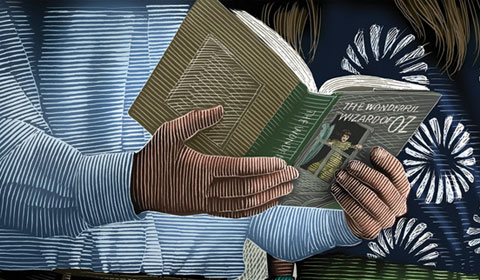A few weeks ago, my five-year-old daughter’s appendix burst. It was a scary, grueling, and altogether unpleasant experience — mostly for her, but definitely no fun for the rest of us, either — and it’s had a number of lingering effects, from the scar on her little belly to the colorful confusion that can go hand in hand with the post-surgery reawakening of the human intestines.
But it wasn’t all bad. In fact, something wonderful came out of all that pain and confusion: I really learned to appreciate the joy of reading to my kids.
Lest you mistake me for a TV dad, let me explain. As the stay-at-home half of my home’s parental duo, I’m the one my kids are generally less excited to see by the end of the day; by the time my wife gets home, all they want to do is be with her, and she’s more than happy to oblige while I crawl into my writerly cave and try and lower my blood pressure. The bedtime routine, including reading, has become mostly her responsibility. Ducking out on this isn’t something I’ve done by design, but it’s definitely helped me reach a few deadlines over the years.
 While she was in the hospital, my daughter obviously spent a lot of time in bed — partly because she was wiped out and afraid to move, and partly because, well, that’s what you do in a hospital. There were times when she was more or less okay with things, but she was miserable just as often, and as a dad, I desperately wanted to do something to make her happy, if only for a little while. At one point, I remembered that my iPad’s iBooks app had a copy of A.A. Milne’s Winnie-the-Pooh stored in it for some reason, so for lack of anything better to do, I opened it and started reading.
While she was in the hospital, my daughter obviously spent a lot of time in bed — partly because she was wiped out and afraid to move, and partly because, well, that’s what you do in a hospital. There were times when she was more or less okay with things, but she was miserable just as often, and as a dad, I desperately wanted to do something to make her happy, if only for a little while. At one point, I remembered that my iPad’s iBooks app had a copy of A.A. Milne’s Winnie-the-Pooh stored in it for some reason, so for lack of anything better to do, I opened it and started reading.
My kids have never been huge Pooh fans, and again, I have no idea why I had that book. But it really did the trick — both in the moment, when the stories made my daughter forget her pain and sent her into hysterical giggling fits, and over the weeks that have followed, as we’ve worked our way through Pooh, its sequel The House at Pooh Corner, and its welcome (though decidedly inferior) recent follow-up, Return to the Hundred Acre Wood. Those books ain’t cheap — the Milne estate keeps a tight, cash-lined grip on all things Pooh — but they’ve been excellent investments. And while my wife still reads to the kids before bed, we’ve started adding in extra reading time, and no one’s complaining.
![51JH5nf4OSL._SS500_[1]](https://www.dadnabbit.com/wp-content/uploads/2011/05/ozmaart.jpg) My mother was visiting from California when all this medical drama happened, and she was there for the start of our Pooh adventures, which might be part of why she recently gifted me with a copy of Alice Ozma’s The Reading Promise. You may have seen Promise discussed in the news lately. It’s the author’s nonfiction account of the nine-plus years her father read to her every single night, from when she was nine until she moved away for college — a period they proudly referred to as The Streak.
My mother was visiting from California when all this medical drama happened, and she was there for the start of our Pooh adventures, which might be part of why she recently gifted me with a copy of Alice Ozma’s The Reading Promise. You may have seen Promise discussed in the news lately. It’s the author’s nonfiction account of the nine-plus years her father read to her every single night, from when she was nine until she moved away for college — a period they proudly referred to as The Streak.
It sounds like an inspirational story, and it really is, but it’s more than that. Believe me, I have enough parental self-loathing already; I didn’t need to read a book about some jerkoff dad’s legendary awesomeness. But around the edges of her inspiring tale, Ozma paints a piercingly honest portrait of her overwhelmed and sometimes emotionally distant parents, their broken marriage, her awkward adolescence, and many of the trials they faced — in other words, some of the many small, lingering failings we face as members of our own families. It isn’t about unattainable greatness, it’s about people reaching for each other — clinging to each other — the only way they know how. In between all the words shared in The Reading Promise, it’s the ones left unsaid that carry the most weight. Isn’t that the way it is with most families? More than the things we say, we are the sum of our actions.
For some time now, I’ve been struggling with Dadnabbit’s direction, and my writing in general. As I wrote over at Popdose a couple of months ago, I’ve largely lost interest in writing reviews; I want what I write to mean something, and as I circle that statement’s meaning, trying to untangle it, I’ve spent most of this year focusing on interviews that, to varying degrees, focus on the creative process. That was the impetus behind our ongoing Conversations series here, which will continue, although I’d like to broaden its focus to include more family media — more family experience.
Also — and I hope you’ll indulge me here — I’d like to give Dadnabbit more of a personal focus. To dwell less on giving thumbs up or thumbs down to kids’ movies or kids’ music, and to open more of a window into my journey as a dad, as glimpsed through the framework of my kids’ experiences. I’m not exactly sure what that means yet, but I feel like I owe it to myself to figure it out. Consider it a sort of writing promise, if you will.


 While she was in the hospital, my daughter obviously spent a lot of time in bed — partly because she was wiped out and afraid to move, and partly because, well, that’s what you do in a hospital. There were times when she was more or less okay with things, but she was miserable just as often, and as a dad, I desperately wanted to do something to make her happy, if only for a little while. At one point, I remembered that my iPad’s iBooks app had a copy of A.A. Milne’s
While she was in the hospital, my daughter obviously spent a lot of time in bed — partly because she was wiped out and afraid to move, and partly because, well, that’s what you do in a hospital. There were times when she was more or less okay with things, but she was miserable just as often, and as a dad, I desperately wanted to do something to make her happy, if only for a little while. At one point, I remembered that my iPad’s iBooks app had a copy of A.A. Milne’s ![51JH5nf4OSL._SS500_[1]](https://www.dadnabbit.com/wp-content/uploads/2011/05/ozmaart.jpg) My mother was visiting from California when all this medical drama happened, and she was there for the start of our Pooh adventures, which might be part of why she recently gifted me with a copy of Alice Ozma’s
My mother was visiting from California when all this medical drama happened, and she was there for the start of our Pooh adventures, which might be part of why she recently gifted me with a copy of Alice Ozma’s 
![51NR43fS3yL._SCLZZZZZZZ_[1] 51NR43fS3yL._SCLZZZZZZZ_[1]](https://www.dadnabbit.com/wp-content/uploads/2009/09/51NR43fS3yL._SCLZZZZZZZ_1.jpg)